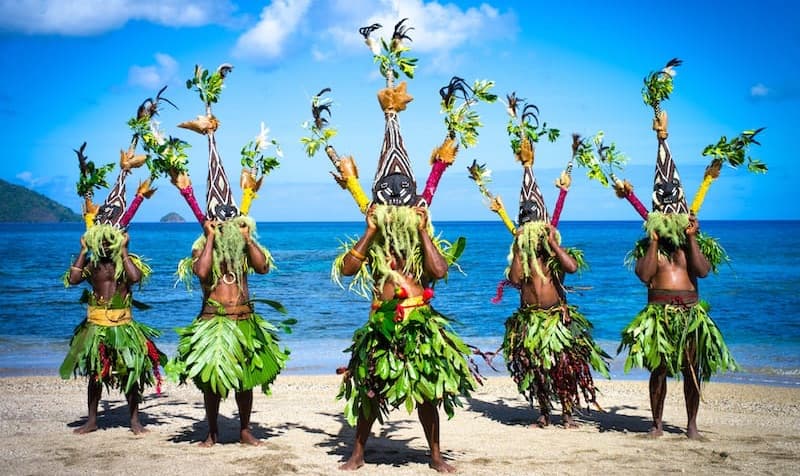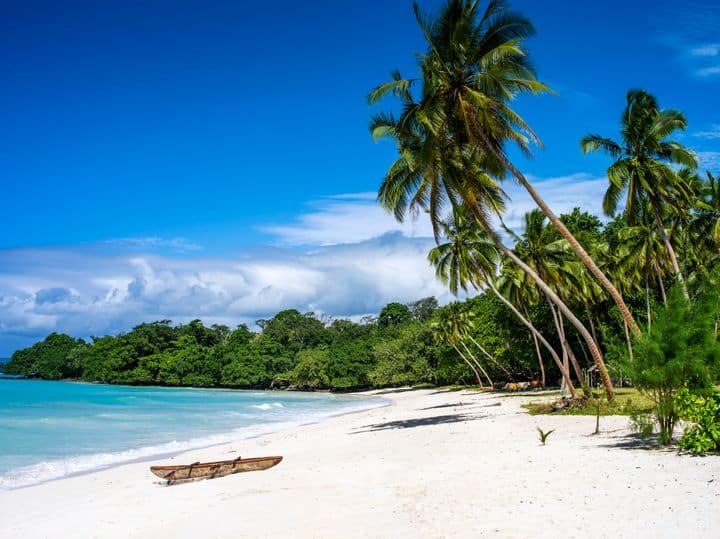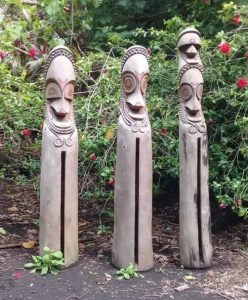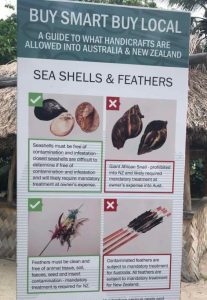Destination Stewardship Report – Autumn 2021 (Volume 2, Issue 2)
This post is from the Destination Stewardship Report (Autumn 2021, Volume 2, Issue 2), an e-quarterly publication that provides practical information and insights useful to anyone whose work or interests involve improving destination stewardship in a post-pandemic world.
Vanuatu Tourism Gets a Reboot

Naluandance, Malekula culture. All photos Courtesy of the Vanuatu Department of Tourism
The pandemic has caused massive disruption to the tourism industry around the world. But it has also created an opportunity for destinations to reboot the sector to move forward in a more thoughtful and sustainable way. Here, Geoff Hyde shares how Vanuatu is doing just that.
Living its Ni-Vanuatu Values: Vanuatu Plans for Resilience, Agritourism, and Cruise Reform
“I rely on volcano tours for my livelihood but I also want to protect my family and community from getting sick from Covid,” said a local guide at a recent tourism workshop in Ambrym, Vanuatu. Indeed, Vanuatu’s Department of Tourism (DoT), in conjunction with public health officials, has been conducting workshops around the country to deliver the twin messages of business survival through financial grants while following health protocols, including vaccinations, to provide safe business and community environments when borders reopen.
Located in the South Pacific, Vanuatu has a strong and authentic Melanesian culture and an abundance of natural assets within its 83 islands. Closure of international borders has plunged the economy into a serious socio-economic crisis. Like most small island states, Vanuatu has been heavily dependent on its tourism sector.

Gaua Beach, Torba Province.
Economic Reliance on Tourism
According to World Bank data, from 2016-18, Vanuatu had the eighth highest proportion of tourism receipts and the seventh-highest direct contribution of tourism to GDP. More recent pre-Covid 2019 tourism statistics from the World Travel and Tourism Council, show the direct and indirect contributions of tourism in Vanuatu accounted for 48% of GDP (Vt 46.8 billion). This data, combined with over 135,000 cruise ship arrivals in 2019 add another Vt 2.1 billion to Vanuatu’s economy (DoT Sustainable Cruise Tourism Plan, 2020.) All totalled, these statistics reveal a high level of reliance on the tourism sector.

Tam-Tams in the Nasara sacred Rom Dance Ground.
Such a dependency was recognised by the Vanuatu DoT well before the pandemic hit. From 2016, the DoT had been planning for and implementing a more sustainable and diversified approach to tourism development. In 2018, Vanuatu DoT joined the Global Sustainable Tourism Council (GSTC) as a destination member and signed an MOU to support Vanuatu’s tourism industry on the progress it had made in the path to becoming a sustainable tourism destination. Funded through NZAid, the Vanuatu Strategic Tourism Action Plan produced the Vanuatu Sustainable Tourism Policy 2019-2030, a key initial project informed by nationwide stakeholder consultation. A vital piece of this policy included its Vision, which states, “To protect and celebrate Vanuatu’s unique environment, culture, kastom [traditional, authentic culture], and people through sustainable and responsible tourism” with its goals and objectives based on a set of these shared values:
“Tourism in Vanuatu embraces the traditional and formal economies; it provides sustainable growth by strengthening national and community resilience with the ultimate goal of delivering equitable economic, social, cultural and environmental benefits for Vanuatu and its people.”
Vanuatu’s Crisis Response in Action
In response to the international border closure, the DoT quickly established the Tourism Crisis Response and Recovery Advisory Committee comprising government representatives, including the Director of Public Health, and private sector stakeholders. Tourism sector policy advice and information was then fed into the National Disaster Management Committee.
This resulted in two planning documents with action plans:
- The Immediate Safety, Response and Economic Recovery Plan, May to December 2020 for short term responses delivered under the five pillars of health, access, product, marketing, and communications; and
- the Tourism Crises Response and Recovery Plan, 2020 to 2023 which became part of – and is now – being implemented through the Vanuatu Sustainable Tourism Strategy 2021 to 2025. Following four themes, the VSTS is more aligned to the GSTC Destination Criteria, the National Sustainable Development Plan, and the UN Sustainable Development Goals:
- Wellbeing: through High Value, Low Impact Tourism
- Resilience: through Niche Tourism Product Development
- Diversification: through Agritourism
- Sustainability: through Certification, Investment and Ni-Vanuatu Entrepreneurship
Despite the setbacks from the pandemic, the DoT has been further encouraged and inspired to implement this sustainable tourism strategy and program as part of the recovery process. This will help diversify the product and create resilience within the tourism sector. Under the VSTS, DoT and its partners are now implementing sustainable tourism programs, utilising one or more of the above themes.
The programs are:
Tourism Business Support Program (TBSP) – launched in March 2021 and managed by DoT through a representative Steering Committee. The TBSP provides financial support and technical assistance for eligible tourism businesses to survive the pandemic’s impacts and have them ready to receive tourists when borders reopen. The eligibility criteria encourage tourism businesses to follow the principles of sustainable and responsible tourism by signing a code of conduct promoting product diversification and increasing local benefits. Financial assistance is available in these categories:
- Tourism Business Survival Grants: for costs associated with cleaning, maintenance, gardening, security, safety, and utility bills.
- Renewable Energy Subsidy Scheme: for equipment and appliance purchasing through the National Green Energy Fund.
- Agritourism Support Program: assistance for selected projects that have integrated the tourism and agriculture sectors into their products. For example, the famed Jungle Zipline attraction is now diversifying into cacao and macadamia nut production to supply local chocolate manufacturers and develop tours when borders reopen.
Safe Business Operations (SBO) Training Program – commenced in October 2020, SBO is mandatory industry training across all sectors to ensure workplace compliance with the health and safety protocols for Covid-19. To date, training workshops and awareness sessions have been delivered to over 2,000 participants in 1,323 businesses across all provinces. SBO is managed by DoT in partnership with the Department of Public Health, the Australia Pacific Training Coalition, the Vanuatu Chamber of Commerce and Industry, World Vision Vanuatu, Vanuatu Institute of Technology, and Vanuatu Skills Partnership.

Sign at a handicraft market.
Agritourism Support Program – encourages diversification and resilience by integrating agriculture and tourism products. It attempts to create a point of difference with Vanuatu’s local cuisine through the ‘Traditional Cuisine Revival Program’ and the ‘Slow Food Educational Program.’ The latter aims to increase the use of local, sustainable, and organic produce within the tourism industry and raise the nutritional quality of food served to tourists. The DoT is implementing a business mentoring program for 27 local businesses who have now formed the Vanuatu Agritourism Association. This includes business planning, management and digital marketing, as well as presentations on the SBO and TBSP.
Cruise Tourism Product Development Program – has been implementing the Vanuatu Sustainable Cruise Tourism Plan adopted in March 2020. The Government of Vanuatu is adopting a stronger presence in the management and control of the cruise tourism segment under ‘high value–low impact’ sustainable tourism principles. The DoT has also recently commissioned independent local consultants to undertake a feasibility study for an Expedition ship to be based in Vanuatu to develop a ‘fly-cruise’ product more conducive to sustainable tourism principles and increased Ni-Vanuatu benefits. A more representative management committee, chaired by DoT, has been established to implement a Memorandum of Agreement (MOA) with the two main cruise companies, Carnival and Royal Caribbean. This MOA was independently reviewed by Sustainable Seas Ltd (UK) and includes references to the GSTC Destination Criteria.
About Geoff Hyde
Mr. Geoff Hyde M.Sc. (Tourism Planning/Development Economics), B.A. (Leisure Planning) is the Managing Director and Principal Consultant of Sustainable Tourism International Ltd. (STIL), a tourism consultancy company dedicated to the principles of sustainable tourism as a tool for socio-economic development. He has spent 30 years as a Tourism Sector Adviser and the last five years as the Technical Adviser to the Vanuatu Department of Tourism.




